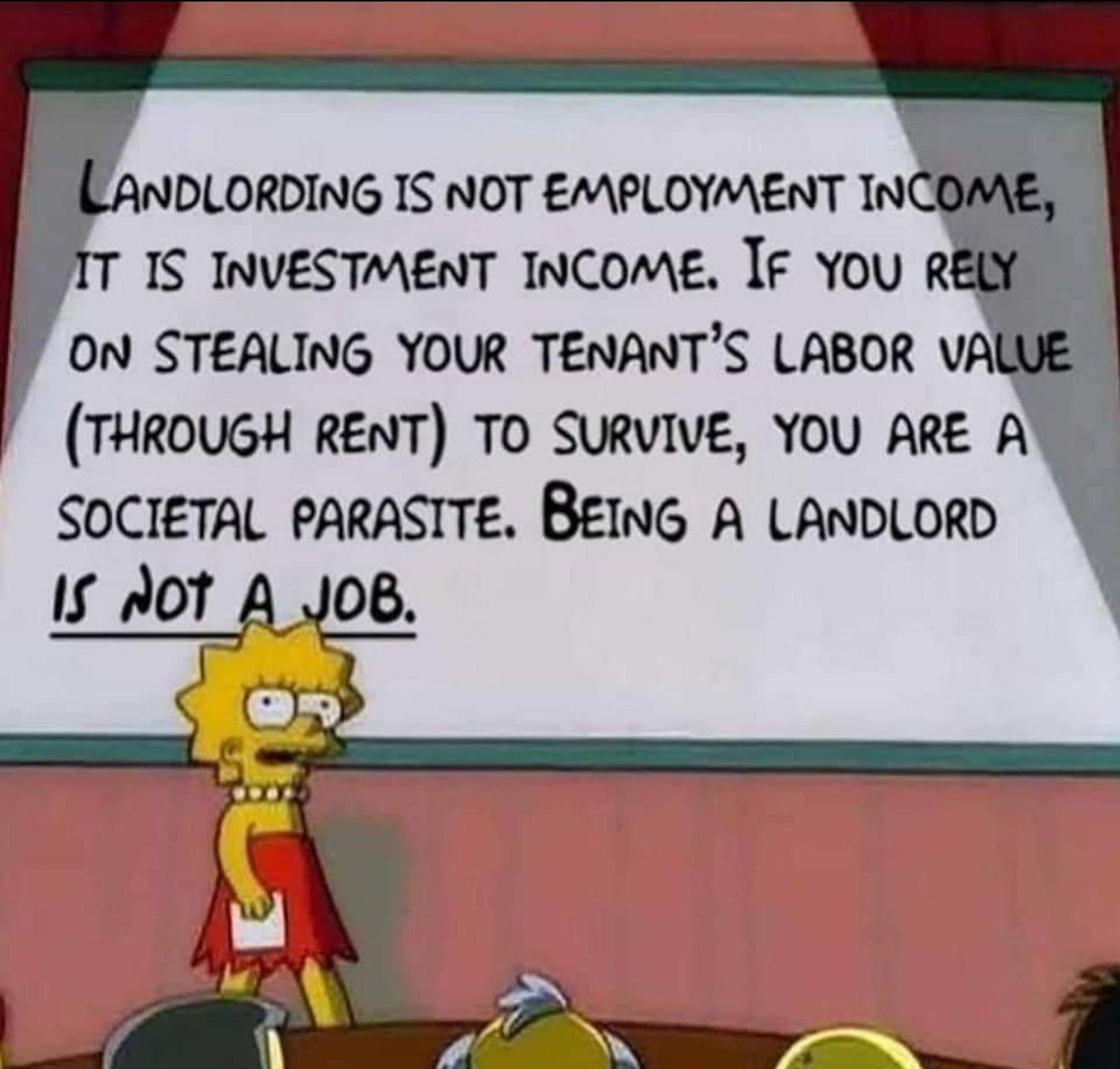this post was submitted on 22 Apr 2024
1032 points (81.4% liked)
A Boring Dystopia
9788 readers
540 users here now
Pictures, Videos, Articles showing just how boring it is to live in a dystopic society, or with signs of a dystopic society.
Rules (Subject to Change)
--Be a Decent Human Being
--Posting news articles: include the source name and exact title from article in your post title
--If a picture is just a screenshot of an article, link the article
--If a video's content isn't clear from title, write a short summary so people know what it's about.
--Posts must have something to do with the topic
--Zero tolerance for Racism/Sexism/Ableism/etc.
--No NSFW content
--Abide by the rules of lemmy.world
founded 1 year ago
MODERATORS
you are viewing a single comment's thread
view the rest of the comments
view the rest of the comments

How has no comment in this thread yet mentioned Georgism or Land Value Tax? That is the solution to Landlordism
A land value tax is a good tool to help ease the transition away from landlords, but it alone is not enough.
Regardless, we definitely should be primarily relying on LVT for government income.
!justtaxland@lemmy.world
it's really not tho, i'm sorry but all Georgism/ and value tax is/was a form of pre-marxist capital taxation.
or do you think that Property tax is stopping BlackRock as we speak?
Property taxes != Land value taxes
Further, it's not a tax on capital; it's a tax on land. It's very explicitly designed to target land, as land has distinct economic properties that make it a prime target for taxation.
And yes, it does target speculative investments like those of Blackrock:
https://osf.io/preprints/osf/54q68
A tax on land is a tax on capital. Land has been capital longer than the concept of capital has existed.
It's not, though. The classical factors of production, whence we get the concept of "capital" as a factor of production, has land and capital as clearly separate:
https://en.m.wikipedia.org/wiki/Factors_of_production
And it's an important distinction. The fact that land is not made and inherently finite makes it zero-sum. Meanwhile, the fact that capital such as education, tools, factories, infrastructure, etc. are man-made and not inherently finite makes them not zero-sum. This distinction has truly massive implications when it comes to economics and policymaking. It's the whole reason LVT is so effective, so efficient, and so fair: it exploits the unique zero-sum nature of land.
It seems you're using a more technical definition than I was. I was thinking something along the lines of definition 1a(3) in this dictionary entry. I agree there are important differences between land and other money-making assets.
The difference is scale. If a house is a safe investment that makes a reliable 10% return on investment before tax and then you pay 1% in property tax, the remaining 9% is still an extremely attractive return so the investor appetite for housing remains unchanged by this small tax. Change the tax to 9% and you're only left with 1% return, suddenly other investment options become much more attractive. Once the investors have left, prices can normalize around the price tolerances of people actually intending to live in the space.
This is a simplification using made up numbers, but the overall point is that the mere fact that property taxes as they currently exist (with very low rates) allow investors to run amok, that doesn't mean that a more substantial LVT couldn't change that.
Obviously taxing in a way that makes rentals completely non viable is probably not a perfect solution, and raising the tax dramatically all at once before prices have a chance to react could be catastrophic, but with a careful incremental approach gradually raising LVT and displacing other taxes (starting with regressive ones like sales tax) with those revenues based on observed outcomes, progress can be made to a better equilibrium where people who want to own a home to live in have better opportunities to do so, people who want to rent still have some options, people aren't getting rich by ransoming housing at extortionate prices, and more investment capital is funneled toward productive enterprise over plots of dirt, strengthening the actual economy.
I think it's probable that the Georgist dream of displacing all taxation with LVT may not be achievable due to diminishing returns on raising the tax as property values react, but I think moving in the direction of Georgist policy could absolutely usher in some better social outcomes